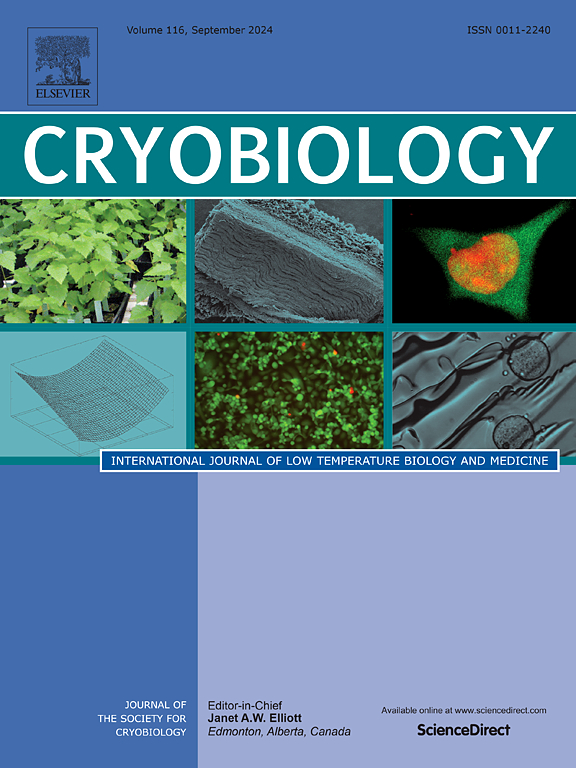罂粟碱通过降低氧化应激和炎症,同时调节冷冻保存过程中凋亡相关基因的表达,提高弱精子症患者的精子质量。
IF 2.1
3区 生物学
Q2 BIOLOGY
引用次数: 0
摘要
精子活力对男性生育能力至关重要,它使精子能够到达并使卵母细胞受精。弱精子症以运动能力降低为特征,通过氧化应激、DNA损伤和线粒体功能障碍导致不孕。用于辅助生殖技术(ART)的冷冻解冻会损害精子。本研究考察了罂粟碱在冻融过程中对改善弱精子精子质量的抗氧化作用。将精子减退症患者精液样本30份分为对照组(新鲜)、冷冻组(冷冻保护剂,孵育30 min)和冷冻+罂粟碱组(冷冻保护剂+ 100 μM罂粟碱,孵育30 min)。分析各组精子参数、DNA片段化、TNF-α、IL-10、活性氧(ROS)、丙二醛(MDA)、总抗氧化能力(TAC)、抗氧化酶活性(SOD、CAT、GSH)、质膜完整性、线粒体膜电位(MMP)以及基因和蛋白水平上Bcl-2、Bax和Caspase-3的表达。在冷冻组,精子参数、抗氧化酶水平、质膜完整性、MMP、顶体完整性、IL-10水平和Bcl-2表达显著降低(p本文章由计算机程序翻译,如有差异,请以英文原文为准。
Papaverine enhances sperm quality in asthenospermia by reducing oxidative stress and inflammation while regulating the expression of apoptosis-related genes during cryopreservation
Sperm motility is crucial for male fertility, allowing sperm to reach and fertilize the oocyte. Asthenozoospermia, marked by reduced motility, leads to infertility via oxidative stress, DNA damage, and mitochondrial dysfunction. Freeze-thawing, used in assisted reproductive technologies (ART), damages sperm. This study examined papaverine's antioxidant effects on improving asthenozoospermic sperm quality during freeze-thawing. Thirty semen samples from asthenozoospermic patients were divided into three groups: Control (fresh), Freeze (cryoprotectant, 30-min incubation), and Freeze + Papaverine (cryoprotectant + 100 μM papaverine, 30-min incubation). Sperm parameters, DNA fragmentation, TNF-α, IL-10, reactive oxygen species (ROS), malondialdehyde (MDA), total antioxidant capacity (TAC), antioxidant enzyme activities (SOD, CAT, GSH), plasma membrane integrity, mitochondrial membrane potential (MMP), and Bcl-2, Bax, and Caspase-3 expression at gene and protein levels were analyzed in all groups. In the Freeze group, sperm parameters, antioxidant enzyme levels, plasma membrane integrity, MMP, acrosomal integrity, levels of IL-10, and Bcl-2 expression significantly decreased (p < 0.05–0.001) compared to controls. In contrast, ROS, MDA, TNF-α, DNA fragmentation, and Bax and Caspase-3 expression significantly increased (p < 0.05–0.001). However, in the Freeze + Papaverine group, all these factors, except acrosomal integrity, showed significant improvement compared to the Freeze group. This study suggests that treating asthenozoospermic sperm with papaverine before freezing improves post-thaw sperm quality by enhancing motility, viability, plasma membrane integrity, and MMP, while reducing oxidative stress, inflammation, and apoptosis—potentially contributing to improved outcomes in ART.
求助全文
通过发布文献求助,成功后即可免费获取论文全文。
去求助
来源期刊

Cryobiology
生物-生理学
CiteScore
5.40
自引率
7.40%
发文量
71
审稿时长
56 days
期刊介绍:
Cryobiology: International Journal of Low Temperature Biology and Medicine publishes research articles on all aspects of low temperature biology and medicine.
Research Areas include:
• Cryoprotective additives and their pharmacological actions
• Cryosurgery
• Freeze-drying
• Freezing
• Frost hardiness in plants
• Hibernation
• Hypothermia
• Medical applications of reduced temperature
• Perfusion of organs
• All pertinent methodologies
Cryobiology is the official journal of the Society for Cryobiology.
 求助内容:
求助内容: 应助结果提醒方式:
应助结果提醒方式:


